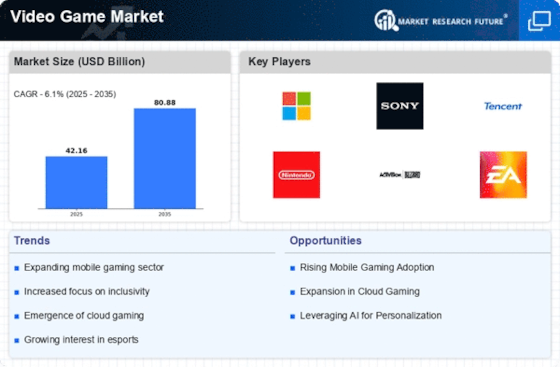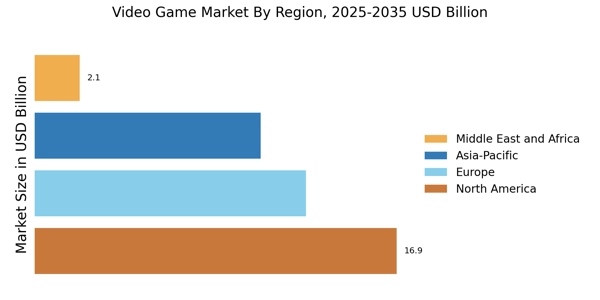Technological Advancements
The Video Game Market is experiencing rapid technological advancements that are reshaping the gaming landscape. Innovations in graphics, processing power, and artificial intelligence are enhancing the gaming experience, making it more immersive and engaging. For instance, the introduction of next-generation consoles has led to a surge in high-definition gaming, with sales of these consoles reaching millions within their first year. Furthermore, advancements in virtual reality and augmented reality technologies are creating new gaming experiences that attract a broader audience. As these technologies continue to evolve, they are likely to drive growth in the Video Game Market, as developers seek to leverage these innovations to create more compelling content.
Mobile Gaming Proliferation
The proliferation of mobile gaming is a key driver in the Video Game Market, as smartphones and tablets become increasingly powerful and accessible. In recent years, mobile gaming has outpaced traditional console and PC gaming in terms of revenue, with estimates suggesting that mobile games account for over 50% of the total gaming market. This shift is largely attributed to the convenience and portability of mobile devices, allowing players to engage in gaming anytime and anywhere. Additionally, the rise of free-to-play models and in-game purchases has further fueled this growth, making mobile gaming an attractive option for both casual and hardcore gamers. As mobile technology continues to advance, the Video Game Market is expected to see sustained growth driven by this segment.
Integration of Social Features
The integration of social features into gaming experiences is becoming a prominent driver in the Video Game Market. Many modern games now incorporate social elements, such as multiplayer modes, online communities, and social media sharing capabilities. This trend enhances player engagement and fosters a sense of community among gamers. Recent statistics indicate that games with robust social features tend to retain players longer and generate higher revenue through in-game purchases. Additionally, the ability to share achievements and gameplay experiences on social media platforms has further amplified the visibility of games, attracting new players. As social interaction becomes increasingly important in gaming, the Video Game Market is likely to continue evolving to meet these demands.
Diverse Game Genres and Content
The Video Game Market is characterized by an expanding array of game genres and content, catering to a wide range of player preferences. From action and adventure to simulation and role-playing games, the diversity in offerings allows developers to target various demographics effectively. This trend is reflected in the increasing number of indie games that have gained popularity, showcasing unique narratives and gameplay mechanics. Moreover, the rise of narrative-driven games has attracted players who seek deeper emotional connections with the content. As the industry continues to embrace diversity in game design, it is likely to foster greater engagement and retention among players, thereby driving growth in the Video Game Market.
E-sports and Competitive Gaming
E-sports and competitive gaming have emerged as a significant driver in the Video Game Market, attracting millions of viewers and participants worldwide. The rise of professional gaming tournaments has transformed gaming into a spectator sport, with events drawing large audiences both in-person and online. Recent data indicates that the e-sports market is projected to surpass $1 billion in revenue, driven by sponsorships, advertising, and ticket sales. This burgeoning interest in competitive gaming is not only increasing the visibility of video games but also encouraging investment in game development and infrastructure. As e-sports continue to gain traction, they are likely to play a pivotal role in shaping the future of the Video Game Market.


















